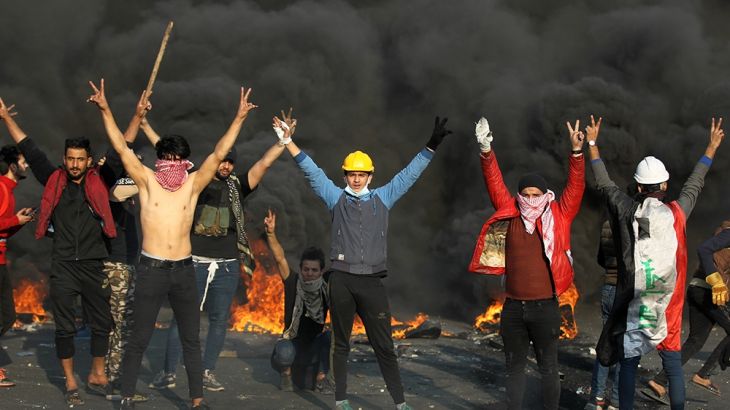‘Here to stay’, vow Iraqi protesters as deadly violence surges
At least five demonstrators killed in Baghdad, Karbala, and Baqubah as security forces open fire.

Iraqi protesters vowed to continue their escalation until demands for an independent prime minister and snap elections are met, as deadly violence surged in Baghdad and several key southern cities.
Two protesters were killed in the capital’s Tayaran Square in the early hours of Monday after security forces fired live ammunition and tear gas to disperse angry crowds, officials said. Another protester was killed in Baghdad later in the day.
Keep reading
list of 3 itemsIraq protesters block roads as they step up calls for reform
Iraq protests swell with people angry at slow pace of reforms
Two died after being struck by live rounds fired by security forces and the third after a tear gas canister pierced his neck, they said.
Witnesses told Al Jazeera that Yusuf Sattar, a photojournalist and volunteer paramedic in his 20s, was among the dead. He was shot in the head by live-fire and died at the scene.
“Yusuf’s injury was quite severe. His head was visibly damaged and he was in critical condition,” said Diaa, 34, an ambulance driver at the scene. “He died right there.”
According to a statement by the National Union of Iraqi Journalists, Sattar was taking photos near Kilani Square when he was shot. Family members and protesters later gathered in central Baghdad to pay their respects at his funeral procession.
|
|
A fourth protester was also killed in the southern city of Karbala after he was shot in the chest, witnesses and a police source told Al Jazeera. A video of the unidentified man showed him in an ambulance as a paramedic attempted to resuscitate him.
The fifth demonstrator died in Baqubah, 50km (31 miles) to the northeast of Baghdad, but details of his death were not immediately available.
In addition to the deaths, at least 100 others were wounded in the violence in Baghdad and Iraq’s south, sources said. The Iraqi government did not confirm the number of deaths or injuries.
A statement from the Baghdad Operations Command said 14 officers were wounded by a group of rock-throwing “inciters of violence” while trying to secure the entrance to Tahrir Square, the hub of the protest movement.
“Despite these actions, our forces continued to exercise restraint and follow up on the security duties assigned to them,” said the statement.
‘Until demands met’
The violence came as security forces tried to clear main highways and squares after protesters gathered to decry the government’s lack of response to their demands.
Last Monday, demonstrators gave the government a week’s deadline to respond to key demands, which included the appointment of an independent prime minister and holding snap elections under a new electoral law.
As the deadline expired at midnight, protesters geared up for further escalations to express their anger. They sealed off main highways and roads inside and around the city, setting tyres on fire, turning back cars and putting up metal barriers to seal off central areas.
|
|
“We plan to keep going, cutting off more of the large highways and roads. Our aim is to bring the city to a complete standstill so the government responds to our demands,” Hussein Hassaan, a 30-year-old protester near Baghdad’s Tayaran Square, told Al Jazeera.
“We’ve managed to bring all movement on Mohamed Qassem highway to a complete stop and we will do the same across the whole city,” he added.
Haider Mohsen, 28, pledged to do the same. “We’ll continue to protest until we have a new electoral law and until Parliament appoints an independent prime minister. We want someone who represents us, not the political parties in power,” he said.
In December, protesters demanding a complete overhaul of the political system rejected a move by the Iranian-backed Binaa parliamentary bloc to nominate Asaad al-Eidani, governor of the southern province of Basra, as the new prime minister.
Demonstrators also publicly rejected other names that circulated as possible replacements.
Escalations in the south
Protests and roadblocks also continued on Monday throughout southern Iraq, including in the cities of Nasiriya, Basra, Najaf and Karbala where demonstrators burned tyres.
In Nasiriya, protesters blocked the main highways linking the city to Baghdad in the north and Basra in the south, where Umm Qasr commodities port is located.
Protesters said they aimed to bring operations at key ports, which receive vital imports including food, to a standstill.
“We won’t allow any trucks from the ports to go any further from here,” Alaa al-Rukaibi, a protester in Nasiriya, told Al Jazeera.
“We don’t care if we starve. We don’t care if they kill us. We are peaceful protesters and we’re here to stay. Our protest is open-ended. We will bring the whole country to a standstill if we have to until our demands are met,” al-Rukaibi said.
US-Iran tensions
Protests across Iraq reignited this week after a temporary lull following spiralling regional tensions in the wake of the assassination of Iran’s elite Quds Force commander, General Qassem Soleimani, in an air strike ordered by US President Donald Trump on January 3.
Protests began in early October in Baghdad and Iraq’s mainly Shia-Muslim south when thousands of Iraqis took to the streets to call for a complete overhaul of the political elite and system, which they see as corrupt, sectarian, and denying Iraqis their basic rights.
At least 470 protesters have been killed since the protests first erupted and 20,000 others have been injured. Rights groups have accused the security forces of using excessive force to crack down on the demonstrators.
In November, embattled Prime Minister Adel Abdul Mahdi stepped down in the wake of the protests, but he remains in office in a caretaker capacity as political parties have so far failed to agree on a new prime minister.